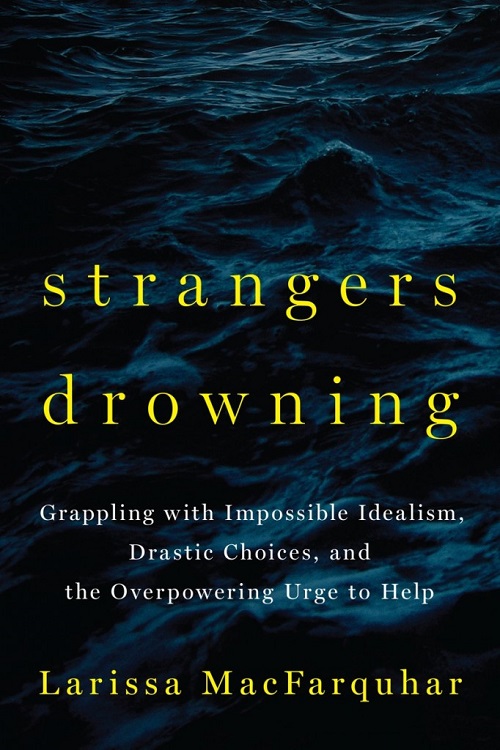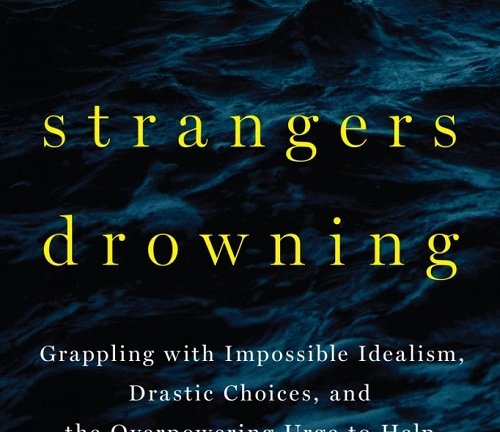Do you think of yourself as an altruist? If so, hold on. You might redefine what that means after reading Strangers Drowning: Grappling With Impossible Idealism, Drastic Choices, and the Overpowering Urge to Help.
This 2015 release by author Larissa MacFarquhar—a longtime staff writer at The New Yorker—offers a first-hand look at what she calls “do-gooders.” These aren’t merely people who do kind things for others, donate to charities, or go out of their way to help during a crisis. These are individuals the author describes as people who push themselves “to moral extremity” and who commit themselves “wholly, beyond what seems reasonable.”

One of the book’s chapters profiles Aaron Pitkin (a pseudonym), who decided to work for an animal rights organization because animals are more oppressed than humans and who chose to focus his efforts on helping the most abused animals of all—chickens. Aaron’s intense devotion to his work and the urgency with which he applies himself to stopping some of the immense suffering in the world sometimes cause him to neglect his own needs: At one point, he slept only three hours a night and worked while walking on a treadmill to keep from nodding off. However, Aaron’s hard work has helped win many victories for chickens. For example, some major corporations have adopted policies that reduce their suffering, and California legislators passed a law requiring that chickens raised for eggs be given almost 70 percent more space.
Other chapters profile do-gooders ranging from a family who founded a sprawling leper colony in a remote area of India to a Japanese Buddhist priest who counsels people considering suicide. One profile chronicles a couple who undertook an open-ended fast to protest nuclear missiles. Although they intended to fast to death, if necessary, they stopped after Korean Air Lines Flight 007 was shot down, killing everyone on board and making it clear that the United States was not going to consider nuclear disarmament. One of the pair lost 40 pounds and was beginning to go blind after not eating for 38 days.
Another couple the book profiles decided the most effective thing they could do to make a difference in the world would be to work at well-paying jobs and donate most of their income to charities that provide developing countries with anti-malarial bed nets, deworming medications, and other necessities.
There’s also a profile about a husband and wife who adopted 20 children—many of whom had been abused, were mentally or physically disabled, or were terminally ill. Despite being loved and cared for, many of the children became pregnant as teens, were expelled from school, ended up on welfare, or got arrested. However, even through these trials and failures, the couple and their adopted children remained a family.
A chapter about a man who donated a kidney to a stranger explores the way that mores can change over time, pointing out that we once thought it strange and suspicious for people to donate their organs even to their family members, while now, it’s considered commonplace and unusual or even wrong not to. (For further proof that society’s ideas about right and wrong can evolve for the better, consider how SeaWorld‘s ticket sales have tanked since PETA and the documentary Blackfish began raising awareness of how orcas suffer in captivity.)
While few of us are as altruistic as the people Strangers Drowning discusses, there are things each of us can do to make the world a better place, and MacFarquhar includes several. For example, she writes that sociologists studying non-Jews who risked their lives to save Jews during World War II found that the “rescuers'” parents taught them to care for others; whereas, nonrescuers’ parents taught them to work hard or be obedient. This makes a strong case for teaching kids compassion, both at home and in the classroom, through humane education.
The people profiled in Strangers Drowning have achieved tremendous good, saved countless lives, and made the world a better place—even though their achievements came at a great personal cost for some of them and their families. It’s a fascinating, humbling, and inspiring read.





